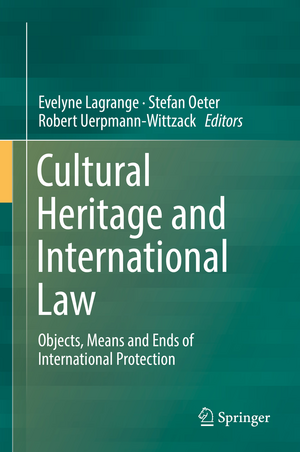Cultural Heritage and International Law: Objects, Means and Ends of International Protection
Editat de Evelyne Lagrange, Stefan Oeter, Robert Uerpmann-Wittzacken Limba Engleză Hardback – 12 iul 2018
| Toate formatele și edițiile | Preț | Express |
|---|---|---|
| Paperback (1) | 999.27 lei 6-8 săpt. | |
| Springer International Publishing – 19 ian 2019 | 999.27 lei 6-8 săpt. | |
| Hardback (1) | 1005.43 lei 6-8 săpt. | |
| Springer International Publishing – 12 iul 2018 | 1005.43 lei 6-8 săpt. |
Preț: 1005.43 lei
Preț vechi: 1226.13 lei
-18% Nou
Puncte Express: 1508
Preț estimativ în valută:
192.38€ • 200.88$ • 158.87£
192.38€ • 200.88$ • 158.87£
Carte tipărită la comandă
Livrare economică 15-29 aprilie
Preluare comenzi: 021 569.72.76
Specificații
ISBN-13: 9783319787886
ISBN-10: 3319787888
Pagini: 281
Ilustrații: VIII, 281 p. 3 illus. in color.
Dimensiuni: 155 x 235 x 18 mm
Greutate: 0.6 kg
Ediția:1st ed. 2018
Editura: Springer International Publishing
Colecția Springer
Locul publicării:Cham, Switzerland
ISBN-10: 3319787888
Pagini: 281
Ilustrații: VIII, 281 p. 3 illus. in color.
Dimensiuni: 155 x 235 x 18 mm
Greutate: 0.6 kg
Ediția:1st ed. 2018
Editura: Springer International Publishing
Colecția Springer
Locul publicării:Cham, Switzerland
Cuprins
Robert Uerpmann-Wittzack, Introduction: Cultural Heritage Law and the Quest for Human Identities.- Part I Linguistic Diversity: Sophie Simon, Le commissaire aux droits de l’homme du Conseil de l’Europe, un acteur de la protection de la diversité linguistique.- Caroline Westphal, Minority Languages in Education in Europe: A Contrasting Exercise of the Cases of the Catalan in Catalonia in Spain and the Sorbian in Germany.- Stefan Oeter, Intangible Cultural Heritage in Need of Protection: The Case of Regional and Minority Languages.- Part II Other Cultural Goods and Heritage: Amandine Lizot, Réflexions sur la circulation internationale des collections muséales : De l’immunité à la copropriété ?.- Fabian Michl, The Protection of Cultural Goods and the Right to Property under the ECHR.- Claire Sainte-Beuve, Diversité et patrimoine culturels : Réflexions autour de la mise en œuvre de la Convention du patrimoine mondial.- PartIII Protection in Times of War: Gabriele D’amico, Blue Helmets of Culture: Involving Communities in the Protection of their Heritage.- Martin Gerner, Managing Cultural Sustainability: Safe Haven, Cultural Property and Sustainability in Best Practice.- Jérémy Hall, Les défis culturels de la Cour pénale internationale.- Part IV Cultural Identity: Claudia M. Hofmann, ‘Leitkultur’ meets German ‘Angst’ – On the Role of Values and Needs in the German Debate on the Integration of Refugees and Migrants.- Lukas Rass-Masson, Le droit international public et le respect de l’identité culturelle en matière de statut familial.- Mariana Monteiro de Matos, Cultural Identity and Self-determination as Key Concepts in Concurring Legal Frameworks for the International Protection of the Rights of Indigenous Peoples.
Notă biografică
Prof. Dr. Evelyne Lagrange, Pantheon-Sorbonne University, IREDIES, Paris, France
Prof. Dr. Stefan Oeter, Chair of German and Comparative Public Law and Public International Law, Faculty of Law, University of Hamburg, Germany
Prof. Dr. Robert Uerpmann-Wittzack, Chair of Public and International Law, Faculty of Law, University of Regensburg, Germany
Textul de pe ultima copertă
This book explores the objects, means and ends of international cultural heritage protection. It starts from a broad conception of cultural heritage that encompasses both tangible property, such as museum objects or buildings, and intangible heritage, such as languages and traditions. Cultural heritage thus defined is protected by various legal regimes, including the law of armed conflicts, UNESCO Conventions and international criminal law. With a view to strengthening international protection, the authors analyze existing regimes and elaborate innovative concepts, such as blue helmets of culture and safe havens for endangered cultural heritage. Finally, the ends of international protection come to the fore, and the authors address possible conflicts between protecting cultural diversity and wishes to strengthen cultural identity.
Caracteristici
Covers the entire spectrum of movable, immovable and intangible cultural heritage Tackles current problems such as protecting the cultural identity of migrants or criminal responsibility for the destruction of cultural heritage Proposes innovative concepts such as blue helmets of culture and safe haven for endangered cultural heritage
